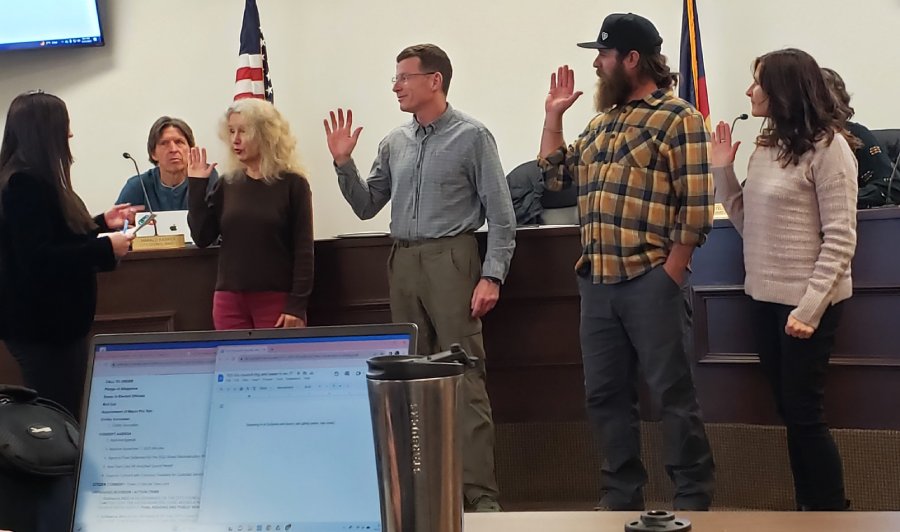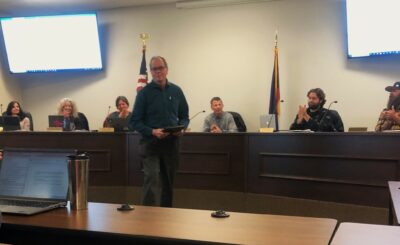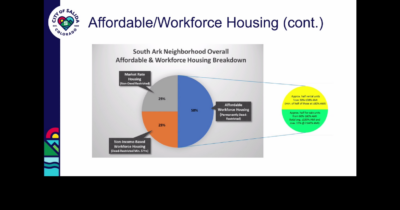
Salida City Council members sworn in after 2023 election. Left to right: City Clerk Erin Kelly, returning members Alisa Pappenfort and Dan Shore (Mayor), with new members Aaron Stephens and Suzanne Fontana. Treasurer Ben Gilling was ill and sworn in remotely. (Visible on the dias behind Pappenfort is Council Member Harold Kasper.) Merrell Bergin photo
New City Officials Sworn in
The November 21 meeting of the Salida City Council (SCC) featured the swearing-in of newly elected officials, recognition of outgoing officials, and election of the Mayor Pro-Tem.
Old Business included public hearings and second readings on Ordinances 2023-14 – 16. New Business addressed Resolution 2023-50, amending a previous approval of an inclusionary housing agreement for the development at 505 Oak Street; and Ordinances 2023-17 and 18, setting second readings and public hearings for the Flour Mill annexation and rezoning.

Retiring Salida City Treasurer Merrell Bergin receives plaque from Mayor Shore. Nov. 21, 2023. Courtesy photo
City Clerk Erin Kelly swore in new Council members Suzanne Fontana and Aaron Stephens, returning member Alisa Pappenfort, and Mayor Dan Shore, who were present in person.
New Treasurer Ben Gilling, who was ill and not present, was sworn in online.
Shore proposed that Justin Critelli continue in the role of Mayor Pro-Tem. Harald Kasper made the motion to that effect, which passed unanimously.
Shore also presented a plaque to outgoing Treasurer Merrell Bergin, thanking him “for your professionalism and commitment.”
During citizen comment, Danny Taylor, the “F Street gun guy”, made an appeal to decry a possible ordinance to ban open carry of firearms in downtown Salida. He chose to lead his remarks with a reference to the recent murder of three Westcliffe residents. As his time limit expired, Shore promised to talk with him later.
After brief public hearings, motions to approve Ordinances 2023-14, allowing a variance for private wells on properties being annexed into town, and 2023-15, establishing the Sustainability Committee as a permanent advisory body to the SCC, passed unanimously.
South Ark deed restriction details consume majority of council meeting
Community Development Director Bill Almquist made a repeat presentation for the benefit of new Council members on Ordinance 2023-16, approving substantial modification to parcels in the Vandaveer Ranch property. The modification calls for a shrinkage in residential acreage in the South Ark Neighborhood, expansion of recreational acreage, and codification of residential zoning, with an emphasis on workforce housing definitions.
“100 units [out of 400 proposed housing units] would be non-income-based workforce housing – giving locals first dibs while still ensuring financial viability of the project,” said Almquist. “STRs (Short-Term Rentals) are not permitted in the South Ark Neighborhood. There will be one deed-restricted unit built for every three market-rate units. Up to 30 ADUs (Accessory Dwelling Units) will be permitted throughout the site in various areas.”

Image courtesy of the City of Salida
“25 percent of units with five-year deed restrictions – if [buyers] are able to purchase them and then sell them five years later, that creates a windfall situation – how would you address the issue of these people getting a subsidy?” asked Shore.
“I have a difficult time seeing it as a ‘subsidy’ – the city isn’t subsidizing [workforce housing] – the only difference is that there’s a bonus provision for the local workforce. People might live [in a given unit] for a generation or more,” Almquist said.
“You also believe that this provision and going in this direction is pivotal to this huge project paying for itself?” asked Critelli.
“50 percent of homes that are [selling at] market rate will pay for the affordable units,” Almquist replied.
South Ark alternate views and options lead to continuance
“I wanted to bring up a few things, and present some options and issues,” said Chaffee Housing Trust Executive Director Read McCulloch, during public comment. “This is city-owned land. This is in fact a subsidy to all the units – they are in effect subsidized. I want to make sure that the public at large benefits, and not just individuals.”
McCulloch suggested the possibility of the city’s implementing a “Windfall Prevention & Subsidy Recovery,” arguing that “if there is a differentiation in price at the initial sale, that amount should be subject to recovery or recapture at the selling event that lifts the restriction, preventing windfall gain by the lucky seller. Instead, the subsidy should be recaptured and directed to future housing needs.”
He also suggested a “Perpetual Workforce Restriction”, so that units initially sold with a Workforce Deed Restriction (or other covenant) should be held to that in perpetuity; with the proviso that if a workforce seller is unable to find another qualified workforce buyer (per city criteria at the time of sale) after 90 days on the market, then they could sell to a market-rate buyer, with the deed restriction staying in place.
“I really like Read’s ideas,” said BETCH President (and Housing Authority — CHA — Board Member) Salty Riggs. “I think we should consider them. This housing crisis is a multi-faceted problem. Sometimes we dumb the issues way down so as not to lose people in the weeds – we need a multi-faceted approach. We do have a problem with some of the deed restrictions – the [income] gap gets wider and we never get people up the next rung of the ladder.”
CHA Executive Director Ashley Kappel also spoke. “The South Ark Neighborhood is a big part of the affordable housing solution – let’s consider further exploring the 100 units for non-income-based housing … I think it does warrant further discussion. I’m in support of the project, I just recommend further exploration.”
“I want to commend the SCC for putting all the thought and energy into a well-planned design for housing in the community,” said Betsy Dittenber, Chaffee County Community Foundation Executive Director: “I commend and applaud their efforts. I want to reiterate that [the former Vandaveer property] is a community resource – I want the workforce housing deed-restricted in perpetuity.”
“I appreciate Read’s thoughts,” said Almquist, at the end of public comment: “My concerns are two-fold: we risk not being able to sell those units if they are being sold at market rates and [sellers] can’t realize a profit. A [windfall] clawback adds significant paperwork layers – this could be a problem for CHA administering the deed restrictions. The CHA is still brand new and doesn’t have a stable funding stream yet. I would suggest that if the choice came down that route, we might make things simpler by making 50 percent of units deed-restricted and 50 percent not.”
“What you can take on realistically remains to be seen,” said Studio Seed’s Cheney Bostic, lead consultant on the project: “What we have tried to do with this project is to be realistic about what you can do. I don’t want that to stop big thinking, but we are dealing with high inflation rates and construction costs. The subsidy is [the city] bringing in the infrastructure…that’s the subsidy to making anything happen, that’s a huge cost and makes things affordable. We don’t have a crystal ball, but I really think we have tried to present this from every angle and come up with something realistic.”
“If we pass this tonight, when could you start breaking ground?” asked Pappenfort.
“If the City of Salida is the developer and puts the infrastructure in, we have access to funds that other developers don’t – if we don’t get any grants, and we have to put out a Request for Proposal (RFP), then the number of affordable units will go down,” Almquist replied.
“It feels like we have one shot to do this – that’s why this discussion is getting intense,” said Critelli during council deliberation. “The amount of land we have [for residential development] keeps getting smaller and smaller.”
“How much can we guarantee that this development is really helping our workforce and at the same time will be really affordable?” asked Council Member Harald Kasper. “We have heard from the experts and they don’t really know either. Could deed restriction be made longer – seven years, ten years?”
“Most of that land out there is going to be open space,” said Shore: “A lot of this information is new, we can always continue this until December 5 – in the interim we can always look at things more closely.”
Pappenfort made the motion to continue a vote on Ordinance 2023-16 until December 5. Kasper seconded, and the motion passed unanimously.
Flour Mill annexation and zoning advance
In other business, the SCC approved a contract with Conscious Creations for cleaning services at the pool before moving to Resolution 2023-50, adding a Section 7 to determine responsibility for shared access between the firehouse and the 505 Oak Street project. A motion by Kasper to approve the resolution passed unanimously.
Ordinance 2023-17, approving the annexation for the Flour Mill development, and Ordinance 2023-18, approving a change in zoning for the development, were also passed on unanimous votes, with second readings and public hearings set for December 5.






Recent Comments